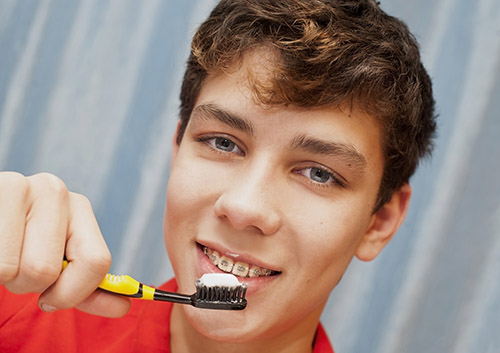Talking Over Your Underbite
April 6th, 2022

You’ve been told that you have a malocclusion called an “underbite.” Let’s look at just what this diagnosis means, and what it means for you.
Just what is an “underbite”?
A malocclusion is another way of saying that you have a problem with your bite, which is the way your jaws and teeth fit together when you bite down. In a typical bite, the front top teeth project slightly beyond, and slightly overlap, the bottom teeth.
An underbite, on the other hand, results when the lower teeth and jaw extend further forward than the upper teeth and jaw, causing the bottom teeth to overlap the top teeth.
What causes an underbite?
Underbites tend to be genetic, and run in families, so, most often, an underbite is something you’re born with. The size of your jaws, the shape of your teeth, or both will affect your bite.
A smaller number of underbites develop because of injuries or early oral habits, such as prolonged and vigorous thumb sucking or tongue thrusting.
How do we treat an underbite?
Your treatment will depend on the type and severity of your underbite, and your age when treatment occurs.
- Braces and Aligners
If your underbite is a slight one, caused, for example, by crowded or overly large teeth, braces or clear aligners can help move the teeth into proper alignment.
- Functional Appliances
If the underbite is caused by a problem with upper and lower jaw development, devices called functional appliances can be used to help guide the growth of the jawbones while a child’s bones are still growing and forming.
If you’re a young patient, two appliances commonly used to help correct an underbite are palatal expanders, which gradually widen the upper jaw if it’s too narrow, and reverse pull headgear, which fits both inside the mouth and outside on the face, and provides a steady, gentle pull to encourage the forward growth of the upper jaw.
- Surgical treatment
In some severe cases, surgical treatment can correct an underbite by reshaping the jawbone itself and positioning it further back to align properly with the upper jaw.
Why treat your underbite?
A serious underbite can cause damaged teeth and enamel, painful problems with the temporomandibular joint, headaches and facial pain, sleep apnea, difficulty chewing, eating, and speaking, and can affect confidence and self-esteem.
By following your treatment plan, you’ll not only prevent these consequences, but you’ll achieve major benefits—a healthy, comfortable bite, and an attractive, confident smile. Want to know more? Talk it over with Dr. Kathleen Tavarez at our Menlo Park or San Carlos, CA office for all the information you’ll need!










 Website Powered by Sesame 24-7™
Website Powered by Sesame 24-7™